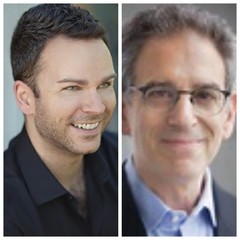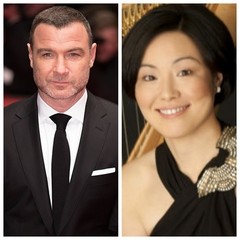|
Back
The Art of French Painting New York
Weill Recital Hall, Carnegie Hall
01/23/2023 -
Camille Saint-Saëns: Tarantelle, Opus 6
Claude Debussy: Cello Sonata – Danse sacrée et danse profane
André Caplet: Conte fantastique
Francis Poulenc: Le Bal masqué
Liev Schreiber (Narrator), Joshua Hopkins (Baritone)
Jerry Grossman (Cello), Members of the Met Orchestra Chamber Ensemble

J. Hopkins/J. Grossman
“Claude Debussy, if he’s not making music, has no reason for existing.”
Claude Debussy
“Her brother-in-law gets drunk and makes the blind lady drunk; he laughs and laughs and then bawls. Ah, the blind lady!”
Max Jacob (translated), to music of Francis Poulenc
What George Szell did with the Cleveland Orchestra, James Levine did with the Metropolitan Orchestra. The former took an excellent provincial orchestra and make it an international phenomenon (see last week’s review). The latter took an oom‑pah orchestra, created to accompany the world’s great singers, and gave them brilliance, polish and First Chair players among the best in the world.
The Met Orchestra Chamber Ensemble showed off these players last night in a classy display of rare French music. The addition of actor Liev Schreiber was a distinguished ornament. Yet from the start, one’s admiration for the musical players was unfettered.
That start was an early piece (introduced by Rossini) showing the genius of Camille Saint‑Saëns, a genius which barely evolved over his next 80 years. The Tarantella could have come from Boutique fantasque, though pianist Katelan Trần Terrell and winds Seth Morris and Jessica Phillips whizzed through the music, probably faster than was called for.
Debussy was twice represented. His Danse sacrée et danse profane is fairly well known and offered a chance for Mariko Anraku to show off her harp chops. As a soloist and Met First Chair harpist, she seemed flawless.
Yet in her ensemble work in André Caplet’s Conte fantastique, Ms. Anraku gave the eerie atmosphere to re‑telling of Edgar Allan Poe. Caplet is best‑known here as orchestral transcriber of piano works by his friend Claude Debussy. Obviously, like most French artist, he revered Poe, and this chamber version of Masque of the Red Death showed his originality.

L. Schreiber/M. Anraku (© Bertinale/Metropolitan Opera)
The music can stand on its own, but last night Mr. Schreiber intoned the original Poe works amidst the strings and harp. Conte fantastique was restrained, mildly spooky, sometimes literal (twelve harp twangs for “midnight”, ballroom rhythms), difficult (Ms. Anraku’s prismatic solos, whooshing strings, tremolos and harmonics). With melodies appearing and disappearing, Poe’s mysteries only hinted at.
Debussy’s Cello Sonata was played deftly by cellist Jeffrey Grossman. Considering the mere ten minute duration, Debussy needed a cellist who could allow all the variegated moods. The work was new to me, so I couldn’t help being mesmerized by Debussy’s inventiveness. Mr. Grossman and pianist Thomas Lausmann started with a kind of 18th Century-style riff, and continued with an enigma. Mr. Grossman’s pizzicato cello movements were buffoonish and mysterious, a comic‑tragedy of delicate texture. As if we didn’t have enough, Debussy went Spanish in the final movement. Or perhaps it was a return to the modal opening.
At any rate, its short duration was anything but terse. Every note counted, nothing was stuck in. This was Debussy at his most innovative.
The final work was the most ecstatically wonderful. Francis Poulenc might be best‑known these days through his opera at the Met, Dialogues des Carmélites. But most of his life was most un‑liturgical. Like his colleague Jacques Ibert, he was a polished and most Gallic composer of satirical, lyrical, melodic songs and piano‑music, ballets and orchestral works.
Little, though, compared with last night’s Bal masqué. If this jaunty romp sounded familiar, it bore a mirror‑like resemblance to William Walton’s Façade. Both used surrealistic poems–the French Max Jacob, the British Edith Sitwell. Both depended on chamber ensembles. And both ran through the nonsense rhymes, accompanied by music that was partly circus, partly jumpy, part ridiculously moribund.
The Met octet was divided into strings, piano, winds, brass and a bass drum. But the leader was Canadian baritone Joshua Hopkins, whose youth belies starring roles in the Met, as well as operas around the world. His voice can be a stirring one. But in Bal masqué, he was as much narrator as singer.
And actor. And what an actor. The poems spoke of drunken blind ladies, Chinese peasants and a “crippled repairer of old motorcars.” Mr. Hopkins danced, pranced and dramatized, both literally and fancifully, the raffish music.
If the concert was a series of pictures, Poulenc and Hopkins created their own version of Marc Chagall. Blessings on them all.
Harry Rolnick
|